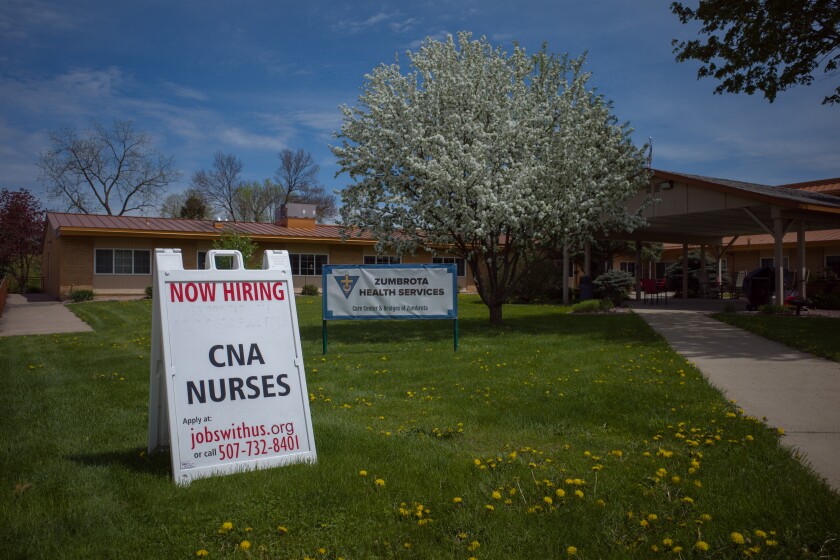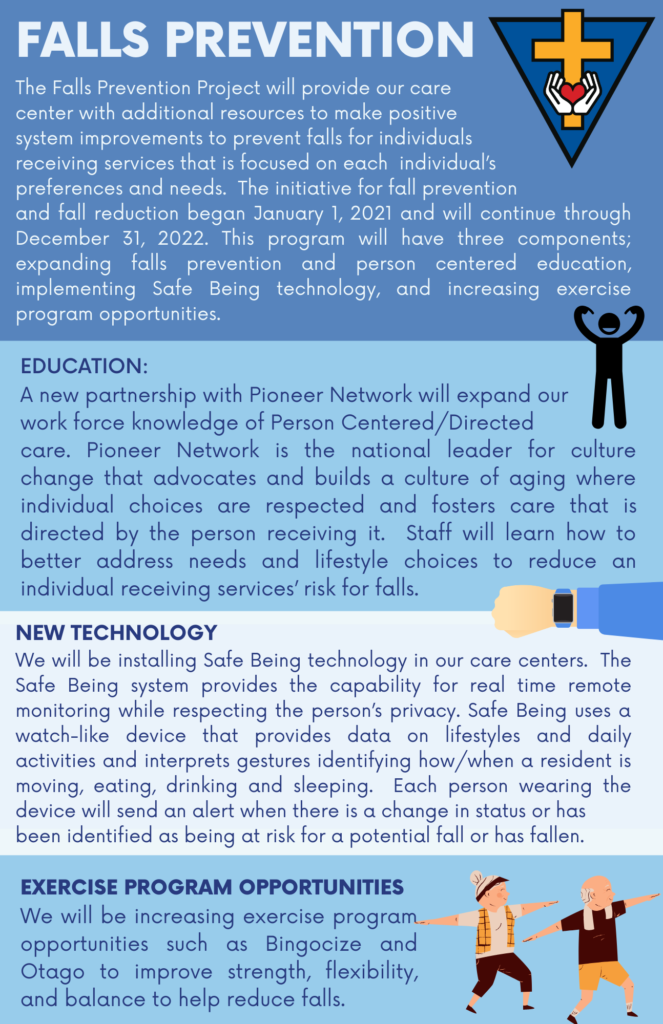The COVID-19 pandemic exacerbated the money struggles already facing care centers. Now, advocates are asking for help from the state to retain workers and keep their facilities open.

ZUMBROTA, Minn. — The Zumbrota Health Services building is noticeably less full than it once was. Rooms down one hallway are mostly unoccupied. Residents sit in the common areas, but it just feels empty.
About four years ago, the senior care center was a 50-bed facility. Now, there’s a 40-bed capacity, but only 32 beds are full.
But the emptiness isn’t just because of a lack of residents. It’s noticeable that the staff is fairly small. And this isn’t exclusive to the Zumbrota facility: There are 23,000 open positions for caregivers across the state.

The staffing shortage is one domino that fell as a byproduct of the biggest struggle long-term care facilities are facing right now: the financial crisis.
Leaders in the long-term senior care industry are heavily advocating the Minnesota Legislature before the session ends on Monday, May 23, 2022, to use part of the budget surplus to ease the financial burden facing so many facilities.
It’s important to note that the financial crisis within the industry wasn’t created by the pandemic, but the associated costs with protective gear and operating COVID-19 units suddenly pushed onto facilities exacerbated the struggle. The crisis even caused five nursing homes to close in the first five months of 2022. Twelve facilities have closed since 2020.
Prior to the pandemic, nursing homes in particular were functioning under tight margins. And, according to Kari Thurlow, the president and CEO of LeadingAge Minnesota, the reimbursement rates set by the state legislature were a big reason for the financial crisis.
Nursing homes are reimbursed for residents through a daily rate set by lawmakers. In Minnesota, the Medicaid rate and private pay rate have to be the same, according to state law. Facilities submit a cost report with their total operating costs to be reimbursed.
The issue is that the expenses are not reimbursed until 27 months after the cost reports are submitted, so nursing homes right now are paid based on 2020 cost reports.
“Most of those costs are before the pandemic got really bad,” Thurlow said. “If you think about all that we’ve been through since, like the huge inflationary increases, the added cost of testing and vaccines and all of those things, none of that has been covered in cost reimbursements.”
Nursing homes, assisted living facilities and other long-term care centers are operating on incredibly slim margins because the costs they face are far more than the reimbursements they are currently receiving from the state.
The lack of money is the reason there’s also a staffing shortage across Minnesota. Thurlow and other long-term caregivers are advocating for a reimbursement rate increase not to ease the operating cost for facilities, but to increase the wages of caregivers in order to retain current workers and attract new ones.
“One of the biggest challenges we have, and you see this all over the state, is that because of inflation and wage inflation, we’re losing caregivers because we can’t keep up with wages. And when we lose caregivers, we can’t admit more residents. And it creates a financial issue,” Thurlow said. “So our theory is by immediately investing in base wages this session, we’re able to recruit caregivers and increase occupancy in our settings to help with the financial crisis.”
It would be helpful to facility leaders like Sue Knutson, who is operating Samaritan Bethany in Rochester with about 200 staff members, down from the 440 she had five years ago. Operating with half the staff means they’re “just not having people move in.”
“It’s difficult because we don’t normally say no,” she said.
Cami Peterson-DeVries, the vice president of senior services at St. Francis Health Services, the parent organization over Zumbrota Health Services, said because of the staffing crunch, the Zumbrota care center has been “very selective in who comes in because we want to make sure that we have enough staff to prepare and take care of them.”

“It really is a sadness in the sense that we’re not able to take care of all the people we’d like,” she said.
Some care centers have navigated the staffing shortages without closing and without compromising care for residents who need the facilities they’re in. But funding is desperately needed for many facilities to continue operating.
“We do need finance. We do need funding,” Peterson-DeVries said. “We as an organization have been working together to say, ‘Okay, how do we tighten our belts? What do we do?’ But there are certain things you can’t compromise on. You can’t compromise on resident care. You just can’t.”












